Living abroad will change you. Things you used to hold dear will seem irrelevant and things you never worried about will quickly become important.
Taking someone out of their ‘natural habitat’ and surrounding them with another culture is going to expose them to a whole range of new experiences, without the stabilising effect of the familiar. Culture shock isn’t just about exposure to a new way of life, but also the absence of what was a familiar constant.Brits may be distraught by a lack of queues in the local market, Argentinians will crave their next cup of mate and the Chinese will search for familiar looking food. Being far from home will also make you evaluate how much your culture may have held you back.

Being slightly anonymous can be empowering, allowing you to let your hair down and to meet new people. You’ll also feel a release from peer pressure and the pressure of society to conform to particular roles.
Expat life can be tough, taking you away from home comforts and your support network. You’ll find ways to be more resilient and to make the most of the little things in life that bring you pleasure. Don’t be at all surprised if your former life seems cluttered and complicated in comparison to your expat lifestyle.
When you eventually return home, expect loved ones to comment on how much you’d changed. You’ll have lived an entirely different life, overcome many challenges and learned not to sweat the small stuff. Here are ten of the most important things expats will learn about themselves.
How to laugh
They say that ‘when the going gets tough, the tough get going’; but whilst many of us grit our teeth and push on through the worst of situations, the toughest are chuckling quietly to themselves.
Giggling might not seem like the most constructive reaction to adversity, but sometimes you just have to chuckle at the ridiculousness of the situation. Laughter, whatever the cause, releases a hit of endorphins. These feel-good hormones reduce stress levels and lower pain levels. Laughter really is the best medicine.

As an expat you may find yourself wading through endless, confusing red tape, or stranded on a random public holiday in a town far from anywhere, or suddenly living in a house with no furniture. Whatever the struggle, step back and take a deep breath before letting it out with a little laugh. You’ll never be overwhelmed by a problem you can laugh at, so have a chuckle and then crack on with solving it.
Always remember, the worse a situation, the better a story it will be to tell your friends.
The value of friendship
It’s easy to feel out of your depth overseas, but just when it feels like you’re about to go under, a lifeline appears in the form of an understanding friend.
When living overseas your support network becomes all the more important. You can’t fall back on family, and your smaller circle of friends is unlikely to understand what it’s like to be so far from home.
Don’t be surprised to find you quickly become attached to people, even if you’ve only just met them. The hospitality and warmth of welcome extended to new arrivals can be genuinely heart-warming, helping you feel like there is someone to turn to when it all goes wrong.

Equally, you’ll extend a helping hand to others, be they locals or fellow expats. You might be from a reserved culture, but you’ll find yourself rolling out the welcome mat and opening your home to visitors in need of a meal or a bed.
Friendships made in adverse or unusual conditions are often stronger than the bonds forged over years of day-to-day life. Don’t be at all surprised if people you knew overseas pop up in your life years later and you pick up the conversation just where you left off.
Embracing differences
Variety is the spice of life, but for some the flavour can seem a little overwhelming. Many expats struggle to adjust to the differences between the culture in which they find themselves and their memories of ‘back home’.
When you land back on familiar soil, you’ll probably be struck down by a dose of reverse culture shock, feeling suddenly overwhelmed by how alien everything seems. You’ll have missed out on a lot of news and pop culture, but you’ll also be surprised just how fast or slow the pace of life is compared to the country of your expat adventures.
The earlier you embrace the weird and wonderful aspects of life in your destination country, the quicker you will learn to enjoy it. If you are constantly thinking ‘this isn’t how we do it at home’, you will never relax, adapt or settle down and be happy.
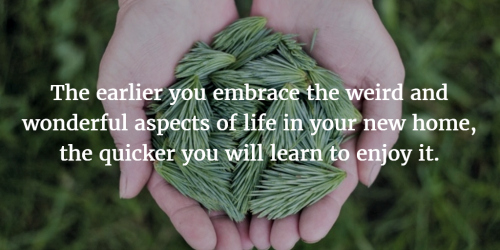
After a few months of trying strange foods, playing new games and partying with the locals you will realise that you are seeking out experiences you haven’t yet been exposed to. Cultivate this newfound aspect of your personality and celebrate being comfortable with the unusual and unexpected.
Letting go of ‘normal’
It might sound similar to the last point, but it is quite different. Stop being so uptight and start seeing things through the eyes of a child.
Forget everything you thought you knew and just go with the flow. Let yourself learn everything over again and stop worrying about being the odd one out.
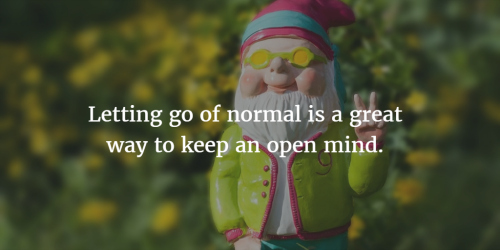
As well as revelling in the difference, enjoy finding what is similar and treat that as an entirely new experience too. There will be an exhilarating grace period when you first arrive, where nobody really expects you to know anything about local culture. Make the effort to learn it as you go and to enjoy that progress. Don’t be afraid to ask questions.
Letting go of normal is a great way to keep an open mind and really get to know the culture in a way you can’t from a guidebook. It’ll also make you brave enough to take up random invitations, go to parties and find yourself having amazing adventures in even the dullest town.
How you can make friends anywhere
There’s a horribly sentimental phrase that states, ‘a stranger is just a friend I haven’t met yet.’ As awfully syrupy as this line is, it’s kind of true for expats. Everyone we meet will be a new face, which can be either massively intimidating or a fantastic opportunity.
In the west we live with a lot of social anxiety, worrying about how others may be judging us, pouring scorn onto us before we’ve said a word. In reality nobody really cares that much, and being a stranger in a strange land can underline this.

Looking different and wearing the badge of ‘foreigner’ can be a liberating experience. We can shrug off our cares and get chatting to people with a refreshing honesty, asking questions and telling stories. If people aren’t open to your advances, it’s easy to shrug them off and move on with our lives. But if there’s a connection, it can become a strong bond.
Communicating across languages is one challenge; an even bigger hurdle is communicating across cultures. We rely on stock questions about work, school, TV and other media to give a ‘safe’ way to relate to each other. None of these topics will apply overseas, so we need to try something else.
Never underestimate how quickly you can make friends armed only with a smile, some humility and some genuine curiosity about each other.
The seasoned expat will have a wide circle of acquaintances, including people met on buses, at work, in shops and on the street.
How to do what you want
Be brave and take the plunge, don’t wait for friends who aren’t so keen.
You’ve travelled halfway around the world by yourself to live in a strange land that’s almost entirely new to you, why do you need a friend to hold your hand for a trip to the market?
As great as your friends may be, don’t let them hold you back from doing the things that excite you. You’ll quickly find yourself politely excusing yourself from the group to go on your own adventures and then meeting up with them again.
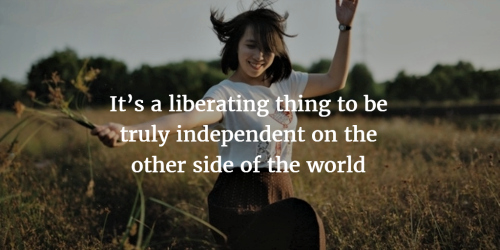
It’s a liberating thing to be truly independent on the other side of the world, and even if you do have a few troubles making yourself understood you can still achieve what you want.
Of course, you don’t need to struggle on alone. One of the most liberating experiences a traveller can have is learning to ask for help. Locals, shop staff and fellow expats are all sources of assistance, just make sure you learn everything you can and display your gratitude appropriately.
How to balance work and life
Holidays abroad are a fun adventure, an escape from the daily grind of chores and work. But expats still have to deal with the trials and tribulations of the nine-to-five. The beaches, museums, mountains and other exciting adventures have to wait until the working day is done.
Even if you’ve moved overseas to give your career a boost, you’ll need to weigh up the work-life balance to ensure that you really get the most out of your time overseas. It would be an awful waste to live in Morocco and not visit the Atlas Mountains, or to reside in Barcelona and not stay out partying at least once on a weeknight.

This is even more important if you’ve moved abroad with your family in tow. Make sure they get rewarded for following you across the globe, spoil them with exciting days out and evenings spent as a family.
Living abroad is the perfect time to hit the reset button and make sure you aren’t cluttering up your life with time-consuming rubbish that keeps you from what’s really important.
How to manage money and how much it’s really worth
You might be earning big bucks in local terms, with the company picking up the tab on accommodation and travel costs, but you have to keep in mind the value of your cash at home.
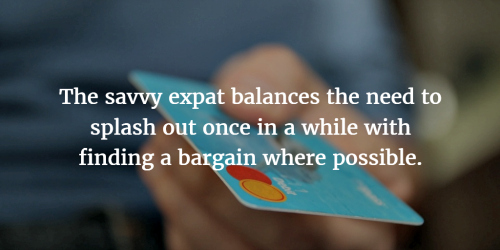
Being paid in local currency may involve pockets stuffed with notes, but this may convert to little more than a handful of beans when you transfer it back. You’ll become suddenly accustomed to mentally converting between currencies and marshalling funds so you have a little in the bank when you go back.
Some short-sighted expats spend time overseas living a luxury lifestyle only to find that they come home with empty pockets and not enough to pick up where they left off.
The savvy expat balances the need to splash out once in a while with finding a bargain where possible. Years after returning you’ll find yourself questioning your purchases and sniffing out deals wherever they are to be had.
How materialistic you are
This one will start even before you leave. As you pack boxes, suitcases and parcels, you’ll have to ask yourself ‘do I need this?’. Most of the time the answer is ’no’ and you’ll start to wonder why you have so much stuff in the first place.
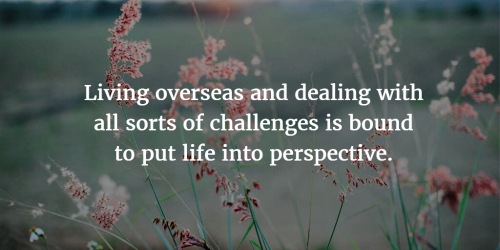
As well as travelling light, living overseas and dealing with all sorts of small challenges is bound to put life into perspective. You’ll learn to appreciate the intangible and to do without technology, fashion and swanky interior design.
What you really value
Following on from the previous point, you’ll learn what you really appreciate.
There are a lot of distractions in normal life, but once life is stripped back a bit you get to see what you genuinely miss and what amazing new things you can’t believe you ever did without. Workaholics overseas often become culture vultures and couch potatoes turn into fitness freaks. Don’t be surprised if you too undergo a transformation.

You’ll also learn a lot about what you really enjoy about work. Had you lost sight of the good bits at home? Starting out again in a new country can let you refocus on the parts of the job that got you excited about it years ago.
Balancing work and life all over again gives you a chance at evaluating what you would like to change and what you really can’t do without.
What did you learn when you moved abroad? Let us know in the comments!
Article by Andy Scofield, Expat Focus International Features Writer

